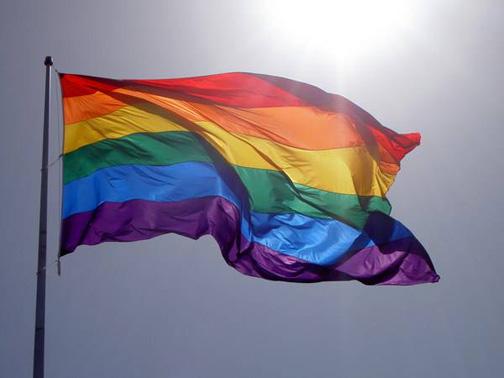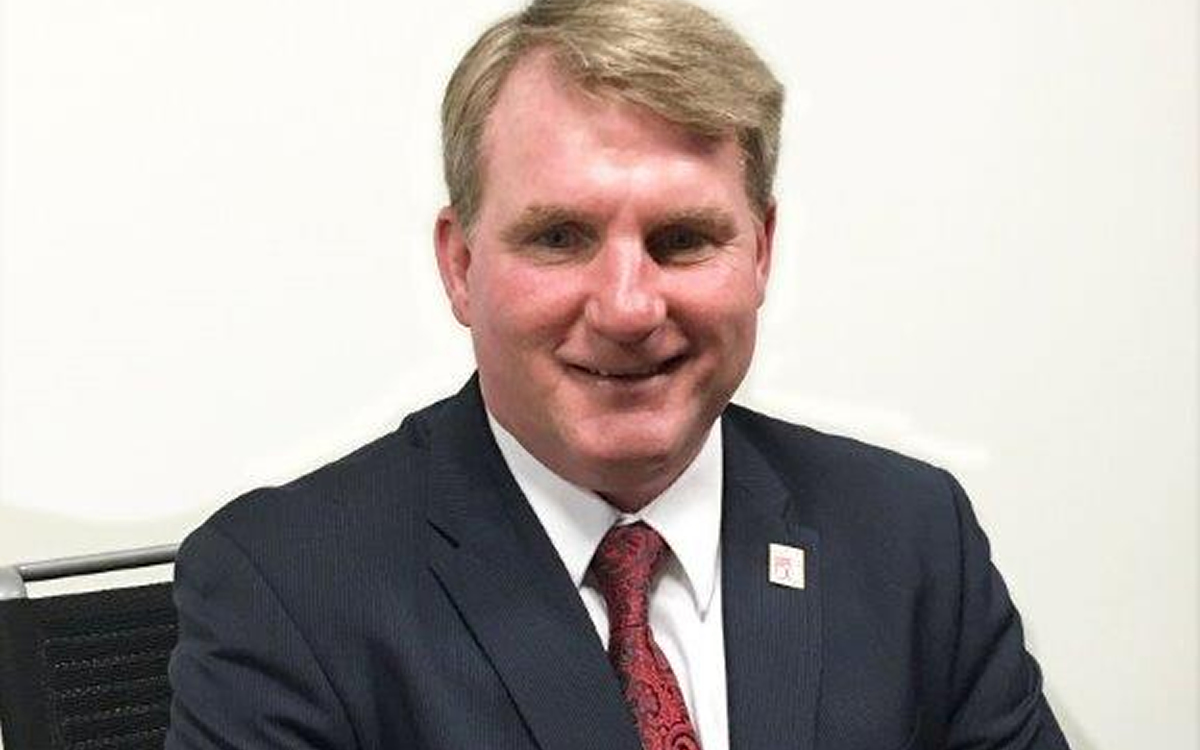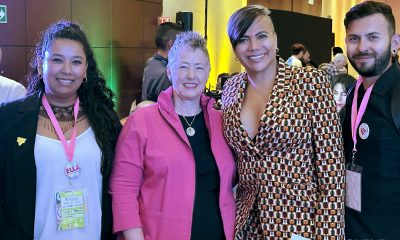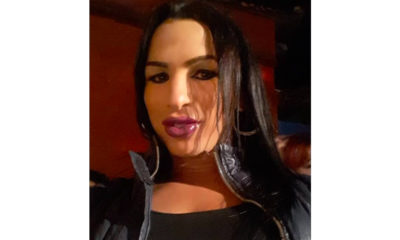News
Trans wedding in Cuba highlights growing tolerance
Raul Castro’s daughter leads campaign against homophobia

In a development considered unthinkable just a few years ago, a transgender woman and a man identifying himself as gay were married in a public wedding in Havana on Aug. 13, with family members, friends and newly emerging gay activists attending the ceremony.
“This is the first wedding between a transsexual woman and a gay man,” the 31-year-old groom, Ignacio Estrada, told the Associated Press. “We celebrate it at the top of our voices and affirm that this is a step forward for the gay community in Cuba,” the AP quoted Estrada as saying.
Although same-sex marriage remains illegal in Cuba, Estrada and his new wife, Wendy Iriepa, 37, told members of a large international media contingent covering the ceremony that their relationship and wedding symbolized some of the positive changes taking place in Cuba for the LGBT community.
But the two said their relationship and wedding also represented a protest of sorts against the government’s continuing crackdown against dissent and free speech. Estrada is a member of an independent gay rights organization that formed in defiance of a strict government rule barring political organizations that are not approved by the government. Fellow gay dissidents were among those attending his wedding, he told the media.
Iriepa told the Miami Herald that her relationship with Estrada prompted officials at Cuba’s National Sex Education Center in Havana, where she worked, to warn her about her association with a dissident. She later resigned from her job in protest over what she said were accusations of disloyalty to the government for her relationship with the man she chose to marry.
Iriepa has disclosed publicly that she had gender reassignment surgery in 2007 under a new government policy that now includes such procedures as part of Cuba’s universal health care system.
One of the leading advocates of the policy change, according to reports from government officials, was Mariela Castro, the daughter of Cuba’s current president, Raul Castro, and niece of Fidel Castro.
In yet another development considered remarkable by LGBT activists in the U.S. and Canada who are familiar with Cuba, Mariela Castro has emerged as a champion of LGBT equality in Cuba in her role as director of CENESEX. She has organized a Gay Pride parade and is coordinating a CENESEX-sponsored campaign to discourage prejudice and discrimination against LGBT people.
Yet some U.S. gay activists with ties to LGBT people in Cuba say the pro-LGBT policies promoted by Mariela Castro are taking place within a political system that prohibits freedom of expression and any criticism of the Communist Party-led government that runs Cuba.
While they see the changes that Mariela Castro has brought about as positive for LGBT people, these activists say LGBT people, like all other Cubans, remain under the control of a repressive government that denies its people freedoms taken for granted in other countries, including access to the Internet.
“Yes there is a trickling, if you will, of some freedoms here and there,” said Heriberto “Herb” Sosa, president of the Unity Coalition, a Miami-based LGBT Latino advocacy organization.
Sosa said his organization has developed a network of LGBT correspondents inside Cuba who communicate clandestinely with his group. He said some of them write articles for a Spanish language LGBT online magazine, Ambiente, which Sosa publishes.
“Unfortunately the regime really hasn’t changed much in the way they offer this relaxation,” he said. “It’s always if you play by the rules, if you’re part of the Communist Party, if you’re in favor of the government – those are the people that are getting a little bit more freedoms, including those within the LGBT community.”
According to Sosa, while Mariela Castro has promoted LGBT-friendly programs, “many dissidents are being thrown in jail or are being harassed and beaten – as recently as last week.”
Other LGBT activists more supportive of Cuba argue that Miami-based Cuban Americans, such as Sosa, have a longstanding bias against the Cuban government, in part, because their parents or grandparents lost financial assets when they fled Cuba for the U.S. in the 1960s following the Fidel Castro-led Cuban revolution of 1959.
The politically influential Cuban American community in South Florida has been credited with persuading Congress and at least eight U.S. presidents to continue the U.S. economic and trade boycott of Cuba, which critics say hurts the Cuban people more than the government.
Cuban American organizations argue that the U.S. trade boycott is needed to set the stage for the eventual replacement of the current Cuban regime with a new democratic government.
“This is not our personal feelings or opinions,” said Sosa. “This is based on what we know is happening inside the island from actual LGBT leaders and dissidents and writers from within the island and every single day send us factual information as to what is going on.”
The international human rights advocacy organization, Human Rights Watch, has called on the U.S. to end the trade embargo against Cuba. But the group has also been highly critical of Cuba’s human rights record, saying little has changed since Raul Castro replaced his brother Fidel as the country’s top leader.
“Cuba’s laws empower the state to criminalize virtually all forms of dissent, and grant officials extraordinary authority to penalize people who try to exercise their basic rights,” the group said in a June 1, 2011, statement.
The European-based human rights group Amnesty International issued a statement in March saying that, in response to international pressure, Cuba released about 50 political prisoners who had been jailed since 2003. However, Amnesty International said the government was detaining a new crop of political dissidents.
“Hundreds of pro-democracy activists have suffered harassment, intimidation and arbitrary arrest in recent weeks as the Cuban government employs new tactics to stamp out dissent,” the statement says.
The Obama administration has relaxed some restrictions that, in the past, have barred most U.S. citizens from traveling to Cuba and prevented Americans, including Cuban Americans, from sending money to assist Cuban relatives.
But the administration earlier this year joined members of Congress in condemning the Cuban government for sentencing an American citizen, Alan Gross, to 15 years in prison for bringing satellite and other communications equipment into Cuba under a U.S. government sponsored program to promote democracy.
Gross said he brought in the equipment to assist the island’s small Jewish community obtain access to the Internet. Cuban authorities accused Gross of engaging in espionage activities on behalf of the U.S. government.
With that as a backdrop, the U.S. State Department surprised some political observers in June when it included an LGBT-related project in an official request for proposals from independent contractors to promote democracy in Cuba.
The request for proposals was issued by the State Department’s Bureau of Democracy, Human Rights, and Labor.
The bureau “seeks proposals to strengthen grassroots organizations to create the conditions that allow meaningful and unhindered participation by members of the lesbian, gay, bisexual, and transgender (LGBT) community in all aspects of Cuban society,” a State Department document announcing the RFP says.
One of the goals of the project, the RFP says, is “strengthening the capacity of grassroots LGBT organizations to register in Cuba as recognized non-governmental organizations.”
The document says the State Department has designated approximately $300,000 to fund the project.
State Department spokesperson Evan Owen said that as of late last week a contractor had not been selected to carry out the project.
Gay Episcopalian activist Charles Briody of D.C., who recently visited Cuba as part of a group called Pastors for Peace, said he’s troubled that the Obama administration hasn’t pushed harder to end the U.S. economic boycott of Cuba.
Briody said he has experienced firsthand Cuba’s evolving attitudes on LGBT equality when family members of his Cuban boyfriend helped organize a commitment ceremony for the couple in his boyfriend’s hometown outside Havana.
“It was really wonderful,” he said. “Everybody was there, including the kids. It was recognition of our relationship for what it is.”
Briody, however, declined to disclose his partner Samuel’s last name, saying he was worried about possible consequences for Samuel from the U.S. government, not the Cuban government.
“I hope to bring him to Washington so we can get married,” he said, adding that he’s worried that U.S. immigration or visa restrictions could prevent Samuel from entering the country. Briody said that upon his retirement as a schoolteacher in Maryland in the near future he hopes to live part of each year in Cuba with Samuel.
He said that during his recent visit to Cuba, he attended a briefing that a CENESEX official held for about 100 members of the Pastors for Peace contingent. According to Briody, the official said the Cuban National Assembly was considering a proposed law that would ban workplace discrimination in Cuba based on a person’s sexual orientation or gender identity.
“My first thought was, wow, Cuba might beat the United States in passing a national law protecting LGBT people from employment discrimination,” he said.
Repeated attempts to reach a Cuban government spokesperson for comment through the Cuban Interest Section office in Washington or through the Cuban Mission at the United Nations in New York were unsuccessful. The phones at both offices were not answered.
A staff member with the Swiss Embassy in Washington, which facilitates the Cuban interest section, said she receives frequent reports by callers who can’t reach anyone at the interest section.
Politics
Smithsonian staff concerned about future of LGBTQ programming amid GOP scrutiny
Secretary Lonnie Bunch says ‘LGBTQ+ content is welcome’

Staff at the Smithsonian Institution are concerned about the future of LGBTQ programming as several events featuring a drag performer were cancelled or postponed following scrutiny by House Republicans, according to emails reviewed by the Washington Post.
In December, Secretary Lonnie G. Bunch III appeared before a hearing led by GOP members of the Committee on House Administration, who flagged concerns about the Smithsonian’s involvement in “the Left’s indoctrination of our children.”
Under questioning from U.S. Rep. Stephanie Bice (R-Okla.), Bunch said he was “surprised” to learn the Smithsonian had hosted six drag events over the past three years, telling the lawmakers “It’s not appropriate to expose children” to these performances.
Collaborations with drag artist Pattie Gonia in December, January, and March were subsequently postponed or cancelled, the Post reported on Saturday, adding that a Smithsonian spokesperson blamed “budgetary constraints and other resource issues” and the museums are still developing programming for Pride month in June.
“I, along with all senior leaders, take seriously the concerns expressed by staff and will continue to do so,” Bunch said in a statement to the paper. “As we have reiterated, LGBTQ+ content is welcome at the Smithsonian.”
The secretary sent an email on Friday expressing plans to meet with leaders of the Smithsonian Pride Alliance, one of the two groups that detailed their concerns to him following December’s hearing.
Bunch told the Pride Alliance in January that with his response to Bice’s question, his intention was to “immediately stress that the Smithsonian does not expose children to inappropriate content.”
“A hearing setting does not give you ample time to expand,” he said, adding that with more time he would have spoken “more broadly about the merits and goals of our programming and content development and how we equip parents to make choices about what content their children experience.”
Africa
Upcoming Ugandan Census will not count intersex people
Advocacy group report documents rampant discrimination, marginalization

Uganda’s national Census next month will not count intersex people.
The revelation about the exclusion of intersex Ugandans in the 9-day Census exercise that will begin on May 10 has been confirmed to the Washington Blade by the head of Uganda’s Bureau of Statistics.
UBOS Executive Director Chris Mukiza in response to the Blade’s questions on the issue said the agency has “no business with intersex.”
Their counting could have made Uganda the second African country and the third globally after Australia and Kenya to collect an intersex person’s data in a Census.
Kenya’s 2019 Census determined there were more than 1,500 intersex people in the country.
Uganda had a population of 34.8 million, according to the country’s last Census that took place in 2014.
Intersex people in Uganda are among marginalized groups, subject to stigma and discrimination. The government has yet to recognize them as the third sex and consider them among other minority groups, such as people with disabilities, who enjoy special treatment.
Intersex people cannot be exclusively categorized as male or female for having a biological congenital condition with unique sex characteristics due to inherent and mixed anatomical, hormonal, gonadal, or chromosomal patterns that could be apparent before, at birth, in childhood, puberty, or adulthood.
Mukiza’s position of excluding intersex people in the Census, however, comes amid the prime minister’s office’s demands for inclusivity and equality for all the population. (The Constitutional Court on April 3 refused to “nullify the Anti-Homosexuality Act in its totality.”)
“We recognize that much work remains to be done particularly in addressing the needs of the marginalized and vulnerable communities, promoting inclusive economic growth, and combating climate change,” said Dunstan Balaba, the permanent secretary in the prime minister’s office.
Balaba spoke on April 18 during the National Population and Housing Census prayer breakfast meeting the UBOS convened. Religious leaders and other stakeholders attended it.
President Yoweri Museveni has noted that data from the country’s sixth national Census will be crucial towards achieving the nation’s Vision 2040 and help the government, non-governmental organizations, and donors in providing services to the diverse population.
“It will also provide the basis for planning the provision of social services such as education, health, and transport, among others at the national and local level,” Museveni said as he urged citizens to fully support the Census and provide accurate information.
Uganda has an intersex rights organization, “Support Initiative for People with Atypical Sex Development (SIPD),” which activist Julius Kaggwa founded in 2008 with the support of groups that advocate for children, women, and other marginalized populations.
Some of SIPD’s work as a non-profit, grassroots organization includes community outreach and engagement, sharing reliable information with the society for the protection of intersex people’s rights, and championing the need for organized medical and psychological support.
The organization, through its numerous reports, has decried human rights violations against intersex people that include surgery without consent, discrimination in homes, schools and medical centers, parents abandoning intersex children, and stigma due to lack of legal protection by the government.
Uganda’s Registration of Births and Deaths Act allows a parent or guardian of a child under the age of 21 to change the name or sex at the local registration office. The SIPD, however, maintains this law is discriminatory to intersex people over 21 who want to change their sex characteristics, and want parliament to repeal it.
The intersex rights organization wants the Health Ministry to establish a central registry to register intersex children after they’re born in order to receive support in terms of healthcare, social and legal by the government and other stakeholders as they grow up.
SIPD particularly wants the government to enact a policy that would allow a gender-neutral marker on birth certificates for intersex children to ease any change of sex in the future. The organization also wants the government, through the Education Ministry, to adopt a curriculum that also considers intersex issues in schools and creates a friendly environment for intersex children to learn and graduate like their non-intersex peers.
These demands follow SIPD’s findings that disclosed many intersex children were dropping out of school because of the stigma and discrimination they suffered. The organization has further called on the public-funded Uganda Human Rights Commission to live up to its constitutional mandates of defending human rights by leading the promotion and protection of the rights of intersex people across the country.
SIPD has also challenged religious leaders, who play a key role in Ugandan society and are influential at the local and national level, to promote acceptance of intersex people and to end discrimination against them.
District of Columbia
Three of five LGBTQ candidates win race for DNC delegate from D.C.
32 candidates competed for 13 elected seats in party caucus

Three out of five known LGBTQ candidates running for election as delegates from D.C. to the Democratic National Convention won their races at an April 20 Democratic Party caucus election held at D.C.’s Walter Washington Convention Center.
Ward 2 gay Democratic activist John Fanning finished in first place with 140 votes and Ward 8 gay Democratic activist David Meadows finished in second place with 127 votes in a race in which six male candidates committed to supporting President Biden were competing for three male seats in a section of the city designated as Congressional District 1, which included registered Democratic voters in Wards 1, 2, 6, and 8.
Ward 7 gay Democratic activist Jimmie Williams won his race, finishing in third place with 200 votes in a race in which eight male candidates committed to President Biden competed for four male seats in the Congressional District 2 section of the city that included Wards 3, 4, 5, and 7.
Gay Democratic activist Felipe Afanador lost his race, finishing in sixth place with 47 votes in the Congressional District 2 election for male candidates backing Biden. It couldn’t immediately be determined which of the four wards in District 2 he is from.
The Washington Blade didn’t learn about Afanador’s status as an LGBTQ candidate until the Capital Stonewall Democrats announced it one day before the April 20 party election in an email statement.
In the Congressional District 2 race among female candidates, in which eight candidates competed for three female seats, transgender rights advocate and Ward 3 Democratic Party activist Monika Nemeth lost her race, finishing in sixth place with 49 votes.
The five LGBTQ candidates were among 32 candidates competing for just 13 elected delegate positions in D.C. D.C. will have a total of 51 delegates to the Democratic Convention, but the other 38 include elected officials and party leaders who are considered “automatic” or appointed delegates. The Democratic Convention will be held in Chicago Aug. 19-23.
Observers familiar with the April 20 party caucus election said Fanning, Meadows, and Williams had participated in local D.C. Democratic Party events and activities for a longer period than Nemeth and Afanador and appear to have been better known among Democratic voters in their respective wards as well as other wards. Those factors contributed to their receiving significantly more votes than most other candidates, observers have said.
In his candidacy statement posted on the D.C. Democratic Party website, Afanador said he worked on the 2020 Biden presidential election campaign in Pennsylvania. His LinkedIn page says in 2022 he began work in Washington for the Biden administration as an official in the U.S. Department of Agriculture.
Nemeth is a past president of D.C.’s Capital Stonewall Democrats, the city’s largest LGBTQ local political group, and has been an active member of the D.C. Democratic State Committee, the local party governing body. She served as a Biden delegate at the 2020 Democratic National Convention.
“It is important for our D.C. delegation to have strong LGBTQ representation,” Capital Stonewall Democrats said in its April 19 statement. “There are five LGBQ candidates running to be delegate, and Capital Stonewall Democrats asks that our members support each one,” the statement says.
“Unfortunately, they fell short, but they and all queer Democrats are welcome to attend and participate in convention events and activities sponsored by the national and local party,” Meadows told the Blade in referring to Nemeth and Afanador. “Our shared goal is to unite behind the Biden-Harris ticket to protect our LGBTQ rights from being dismantled by Donald Trump and the GOP,” Meadows said.
“Running for District Delegate is one of the most grassroots efforts,” Fanning told the Blade. “It’s very beneficial to align yourself on a slate with community leaders that have either previously run for District Delegate or have developed a constituency in their community from other civic engagements,” he said, referring to possible reasons for his, Meadows, and Williams’s election victory.
Aside from the D.C. elected LGBTQ delegates, two prominent D.C. LGBTQ Democratic leaders will be appointed as delegates to the 2024 Democratic National Convention in their role as members of the Democratic National Committee from D.C. They are Claire Lucas, a highly acclaimed Democratic Party and LGBTQ rights advocate and party fundraiser; and Earl Fowlkes, one of the lead organizers of D.C.’s annual Black LGBTQ Pride celebration and former president of the Capital Stonewall Democrats. Both are committed to supporting President Biden as the Democratic nominee for re-election.
-

 District of Columbia5 days ago
District of Columbia5 days agoNew D.C. LGBTQ+ bar Crush set to open April 19
-

 District of Columbia5 days ago
District of Columbia5 days agoReenactment of first gay rights picket at White House draws interest of tourists
-

 Arizona5 days ago
Arizona5 days agoAriz. governor vetoes anti-transgender, Ten Commandments bill
-

 South America3 days ago
South America3 days agoDaniel Zamudio murderer’s parole request denied












